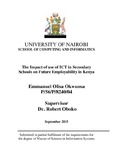| dc.description.abstract | According to the UNESCO Institute of Statistics report on the Education profile in
Kenya (1999), our Secondary School Gross Enrolment ratios (GER) stands at 41%
while our tertiary GER stands at only 4%. An analysis of the labour market shows that
the 15-19 years youth cohort represents the entry node of the Kenyan labour market.
This study sought a clearer understanding of the employability of this youth cohort in
today’s 21st century workplace, where ICT is central. In particular, the study sought to
find out how the youth’s prior use to ICT in secondary school affected their
employability. It related how prior use of ICT in secondary school empowered students
with 21st century workplace skills such as digital-age literacy, inventive thinking,
effective communication and high productivity and the contribution that these skills
made to their employability.
A survey design was used in this research. Data and Information was collected from a
sample of employers, workers and self-employed entrepreneurs. The introduction of
ICT into secondary schools is a relatively new practice in Kenya, therefore there are
only a few currently working or self-employed Kenyans who were exposed to ICT in
secondary school. They are also difficult to locate as no formal register is available.
This posed a challenge in locating a suitable sample population However, the few
Kenyans who were exposed to ICT while in secondary school know one another and
can easily make referrals.
As a result the snowball (or chain-referral) sampling technique was therefore used to
collect data since it is most suited for data sources that are limited, hard to find but one
source has leads to more sources, ending up with a sample size of 50. Quantitative data
was collected using questionnaires and analyzed by the use of descriptive statistics,
factor analysis and regression.
Based on this research model, the study established that the use of ICT in schools
contributed to the acquisition of relevant skills and competencies since the beta value
was positive. It was also found that self-motivated students acquired these skills faster
and better compared to those who were not. However, the environment was not found
to have any moderating effect on acquisition of skills and competencies. There also
exists a direct link between the acquisition of these skills and competencies and
employability. The 21st century workplace was also found to have a moderating effect
on the eventual employability.
Key words: 21st century workplace skills, Self-motivation, Environment, Employability,
Acquisition of Skills and Competencies | en_US |

